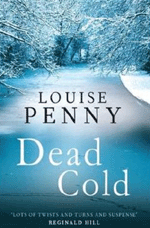"I read your book," said Gamache to Ruth as the two of them sat in front of the cheery fire while Peter puttered in the kitchen and Clara browsed her bookshelves for something to read.
Ruth looked as though she'd rather be sitting in scalding oil than next to a compliment. She decided to ignore him and took a long gulp of her Scotch.
"But my wife has a question."
"You have a wife? Someone agreed to marry you?"
"She did and she was only a little drunk. She wants to know what FINE means in your title."
"I'm not surprised your wife has no idea what fine means. Probably doesn't know what happy or sane means either."
"She's a librarian and she was saying in her experience when people use capital letters it's because the letters stand for something. Your title is I'm FINE with the FINE in capitals."
"She has brains, your wife. She's the first to notice that, or at least to ask. FINE stands for Fucked up, Insecure, Neurotic and Egotistical. I'm FINE."
"You certainly are," agreed Gamache.
Dead Cold (alternately known as A Fatal Grace), by Louise Penny, was a terrific vacation read — swift-moving, not very demanding, but also charming and thoughtful. (The vacation was drizzly, foggy, and at sea, calling for just this sort of thing.)
This is the second in the series of novels featuring Chief Inspector Armand Gamache, and the second that I've read (though I'm reading them out of order).
Penny's latest novel, to be released later this month, is How the Light Gets In, which title comes from a line in a Leonard Cohen song: "There is a crack in everything. That's how the light gets in."
This line crops up in Dead Cold also, and it's clearly a recurring theme of Penny's — the flaws, often fatal (given that these are mystery novels), in characters and in their constructs — the ideas they hold and the lives they build. But the flaws are not wholly negative; they make space for all sorts of wonderful things like love, for illumination and insight, only tragically sometimes (but not always) too late.
Two dead women start off the story, one rich bitch whom nobody liked, the other homeless. Of course they're connected, and more death follows in their wake. Part police procedural, part "cozy," with philosophizing, humour, and lightness.
Set in the fictional village of Three Pines (somewhere in the Eastern Townships), it's populated by artists and poets and book lovers who quote Atwood and Yeats. The sense of place is marvelous; Penny treats Montreal and its environs lovingly. She gets the Ogilvy Christmas window just right. And the cold — as you might guess from the title, there's a lot of cold in this novel; winter in these parts is just like that. Also she deftly incorporates some of the peculiarities of French-English coexistence.
These books satisfy my definition of a comfort read. I'll be reading more from Louise Penny as the nights get chillier.
Excerpt.



3 comments:
I’ve read all sixteen books in the series, and I highly recommend reading them in order as there is an overarching storyline that slowly builds over the first 8-9 books! Reading out of order may give you spoilers you would rather not know!
Absolutely! Penny is a master of building a story line from one book to the next, leaving some pretty loose threads at the end of a book at times, but getting to resolution eventually. Definitely read them in order!
in the tv series A Fatal Grace, the ..... young girl sings a song in church. Where can i go to hear it? are there more stanzas to the song? some lines: 'some people say there will be snow for Xmas, some people say there will be snow'..
a beautiful melody and I'd like to know more about the song.
Post a Comment